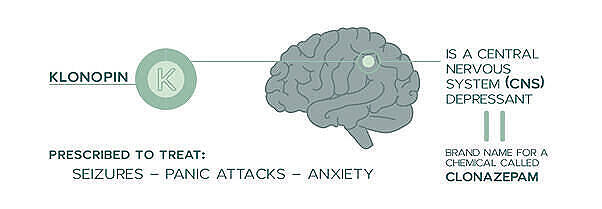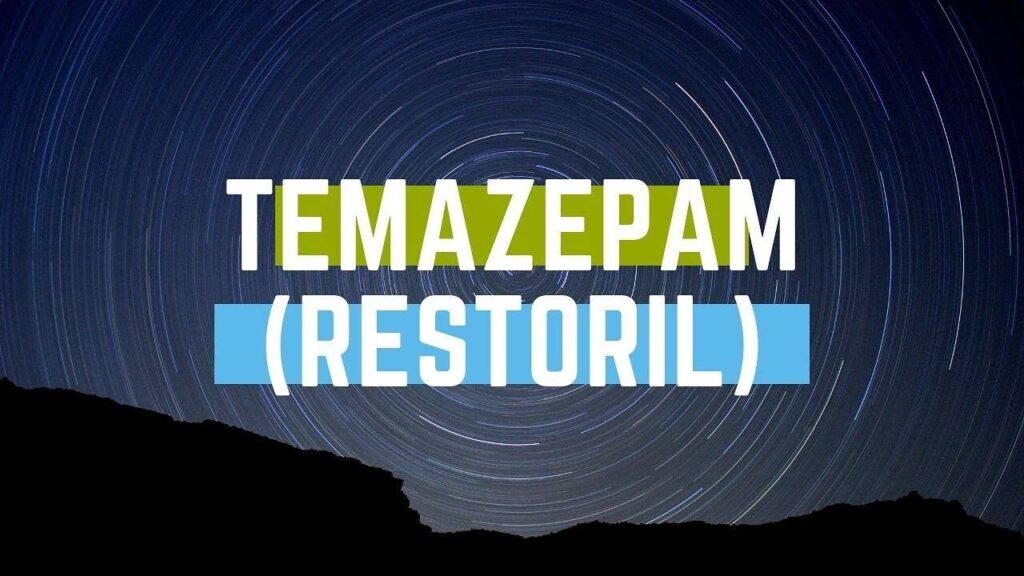What is Klonopin
Klonopin is a well-known name for the benzodiazepine drug Clonazepam.
Klonopin is a prescription-only medicine in the UK. This prescription drug is most commonly used for the treatment of acute anxiety and the prevention of seizures.
It can be abused, and it is a controlled drug and can only be obtained legitimately with a doctor’s prescription.

Klonopin can also be prescribed to patients as an anticonvulsant and antiepileptic drug and for those with panic disorder. Its calming and relaxing effects are very pronounced. These effects, coupled with a feeling of false well-being, can lead to drug abuse.
As with all drugs within the benzodiazepine class, prolonged use can develop into Klonopin dependence and addiction. For this reason, any prescription should be carefully monitored by a medical professional.
How Klonopin (Clonazepam) works
Klonopin works in the same way as other drugs of the benzodiazepine class. Stimulating the release of GABA, a calming brain neurotransmitter, helps restore regular brain activity in an overactive brain.
Klonopin uses
Brain overactivity is commonly associated with seizure-related conditions. It is also prevalent in those who suffer from anxiety-related disorders and abnormal muscle movements.
Treats:
Anxiety disorders, bipolar mania, seizures, agitation associated with psychosis, OCD and akathisia.
Taking Klonopin can prevent seizures and panic attacks, and their related symptoms diminish.
In the instance of Klonopin being prescribed to treat an anxiety-related disorder, a short course of treatment is recommended (2 to 4 weeks). The root causes should be addressed with a therapist or mental health worker during treatment.
Klonopin does not resolve any conditions. It merely reduces the symptoms of conditions it is prescribed to treat.
Effects of Klonopin

The effects of Klonopin commence within one hour of consumption and can last for anything between 6 and 12 hours.
Any side effects are likely to be more severe in the first few days of taking the drug whilst the body and brain acclimate. For this reason, patients should always start with the lowest dosage possible, as per their doctor’s recommendation, and not take any more than prescribed.
Any severe, profound or persistent side effects should be reported to the prescribing doctor
Side effects of Klonopin
Common side effects from Klonopin include:
- Changes in appetite
- Dizziness
- Sleepiness and drowsiness
- Decreased ability to concentrate
- Impaired coordination
- Slurred or slowed speech
- Upset stomach
Serious side-effects of Klonopin (rare) include:
- Rapid heart rate
- Aggression
- Confusion
- Disorientation
- Memory impairment
- Restlessness
- Shortness of breath and feeling very tired
- Feeling low in mood, depressed, thoughts of harming yourself or taking your own life
- Doing things whilst under the influence of Klonopin that you cannot recall, such as driving, eating or talking to people
What to avoid while taking Klonopin
A complication of taking this drug is that your awareness levels, decision-making skills and ability to react to danger will initially be reduced.
Driving and operating machinery
You should avoid driving or operating heavy machinery until you know how Klonopin affects you.
Klonopin and other medications
If you are taking opioids, the use of Klonopin is prohibited. Mixing the two medications has led to severe side effects, including slowed, difficulty breathing and death.
Opioids are used to treat pain and include medications such as codeine, oxycodone, morphine, and illegal drugs like heroin. Some opioid medications are also found in cough syrup.
Accounting for 30% of cases, Klonopin overdose treatment in the form of flumazenil can reverse the effects.
Klonopin and alcohol
Alcohol should not be consumed alongside Klonopin.
Mixing Klonopin with alcohol or drugs will only decrease its benefits. Additionally, using alcohol and drugs whilst on a prescription for Klonopin will increase the drug’s adverse side effects, such as sedation. This will increase your risk of suffering an accident, accidental overdose, respiratory arrest, coma and even death.
If you have issues with drug addiction
One of the main risks associated with Klonopin use is that you can quickly build a tolerance to the effects of the drug. This means that the drug becomes less effective over time and that the original symptoms it was prescribed to treat can return.
If you become tolerant of these effects, it is essential to consult your physician and not increase the dose on your own accord. This can be tempting, especially in the case of rebound anxiety. However, tolerance will only continue to develop and can quickly turn into prescription drug dependence.
Benzodiazepine withdrawal is undoubtedly one of the most unpleasant drug withdrawals a person can experience. Not only are symptoms of Klonopin withdrawal uncomfortable, but they can become life-threatening if the withdrawal is not conducted correctly and safely. If you have developed a dependence, it can be dangerous to stop the medication without your doctor’s guidance.
Pregnancy and breastfeeding
Klonopin can increase the risk of premature birth and low birth weight. Newborn withdrawal and “floppy baby syndrome” are other possible side effects. It is essential to discuss this with your doctor and caregivers.
Regarding breastfeeding, caution is advised since Klonopin does pass into breast milk.
Online Klonopin without a prescription
Sadly, people can buy this medication from the dark web. This is strongly advised against. Not only will there be no regulations in place for the safety of the drug, but self-medication regularly leads to addiction. It is also illicit to obtain a prescription-only controlled drug in this way.
You have liver disease.
When Klonopin is used for patients with existing hyperlipidaemia and liver dysfunction, it may cause an abnormal lipid profile, aggravate liver dysfunction, and lead to remarkable glucose elevation.
You have phenylketonuria (PKU)
PKU is an inherited disorder that causes an amino acid called phenylalanine to build up in the body. Klonopin tablets contain 0.56 mg of phenylalanine.
You have glaucoma
Benzodiazepines can dilate the pupil, so it is conceivable that they could cause problems in a patient with narrow-angle glaucoma.
Klonopin addiction and abuse

If you have been abusing Klonopin or taking large amounts for a prolonged period, you may want to consider an inpatient detox as the safest way of stopping the drug.
Not everyone who becomes addicted to Klonopin starts out abusing the drug. However, your risk of developing an addiction is increased if you do.
Klonopin addiction can also result from a genuine prescription. Perhaps this was the case with you. Many benzodiazepine addictions start very innocently in this way.
Not everyone who takes a benzodiazepine will go on to develop an addiction. They can be taken safely without negative consequences by most people. However, the risk of developing an addiction will be high for certain people, those who carry the increased risk factors for addiction.
Risk factors
- You suffered from a drug or alcohol use disorder
- Have you ever abused drugs (illicit or prescribed)?
- Taking this drug without a prescription.
- Drink alcohol or use other drugs at the same time.
- You have other mental health conditions, such as depression or PTSD.
- Cooccurring mental health illnesses
- Unresolved and untreated trauma
- Environmental and social factors
- Childhood upbringing and adverse traumatic experiences
- A genetic predisposition (A history of addiction or mental health illness in your family)
How do I know if I’m addicted to Klonopin?
Suppose your use of Klonopin has negatively affected other areas of your life, socially, physically, mentally, occupationally or financially, yet you find yourself unable to stop. In that case, you may have a Klonopin addiction.
Some people in the UK use drugs such as Klonopin to self-medicate mental health symptoms and to soothe the symptoms of anxiety, past trauma, mania, or even psychosis. Self-medication is extremely dangerous and often backfires. As previously mentioned, Klonopin has no curative properties. Take the drug away, and the original symptoms return.
Rebound and withdrawal symptoms from the cessation of a benzodiazepine can keep a person trapped in a never-ending cycle of repeatedly trying to stop and failing.
Klonopin withdrawal is most definitely not pleasant. At best, it is incredibly uncomfortable, and at worst, it can cause life-threatening symptoms and seizures.
Benzodiazepine Withdrawal and the Brain

When a benzodiazepine is taken, brain activity is calmed. This results in the user feeling relaxed, calm and even euphoric. Adversely, when a benzodiazepine is stopped, the brain goes into acute overdrive, resulting in some unpleasant and exaggerated symptoms.
During prolonged use of a benzodiazepine, the brain will acclimate to functioning under its influence. When the brain becomes tolerant to the effects, the user will feel no benefits other than staving off withdrawal symptoms. The dosage or frequency of administration will need to be increased to feel the desired benefits of the drug.
Tolerance is never-ending and progressive. With each increase, the brain continues to adjust to functioning. This usually starts to happen over two to four weeks of continuous use.
Abruptly stopping a benzodiazepine where tolerance and dependence have formed is extremely dangerous.
As tolerance is built, the brain needs time to acclimate to a slowly reduced amount. This is why inpatient detoxification for dependence is often recommended. The reduction in medication is carefully monitored and controlled by trained medical professionals, ensuring patient safety.
Physical symptoms of Klonopin withdrawal include:
- Strong drug cravings
- Diarrhoea
- Nausea
- Increased sweating
- Reduced appetite
- Increased heart rate
- Tremors
- Restless legs
- Muscle spasms, aches and pains
- Muscle weakness
- Impaired concentration and ability to process information
- Reduced impulse control
- Insomnia and sleep disturbances
- Seizures
Psychological symptoms of Klonopin withdrawal include:
- Dysphoria
- Solemness
- Confusion
- Erratic thoughts
- Intrusive thoughts
- Acute anxiety
- Irritability
- Restlessness
- Thoughts of self-harm and suicide
If you think you may have developed a dependence on Klonopin, it is essential to seek medical advice before attempting to stop the drug.
A complete medical detox carried out within a rehabilitation facility will make your detoxification much more comfortable and, more importantly – safe. Additionally, you will also receive professional support for the psychological aspects of Klonopin withdrawal and have the opportunity to undergo a bespoke rehabilitation programme.
If you are considering taking Klonopin, less addictive drugs are available.
Treatment for Klonopin Addiction
As Klonopin addiction has become increasingly prevalent in the UK, more and more facilities have been established around the country to deliver treatment for the condition. Addiction can be successfully treated using evidence-based addiction treatments.
Addiction treatment is most intensive and successful when carried out within the safety of a registered detox and rehab facility.
In any addiction, the safe removal of the problematic substance is merely the beginning of the recovery journey.
Addiction is medically recognised as a chronic substance use disorder and a brain disorder. Treatment is, therefore, targeted at healing and rewiring the brain.
Depending on the rehab you choose, the treatment programme can vary tremendously. This is why it is crucial to seek professional guidance to ensure you access the most appropriate treatment.
Treatment for Klonopin Addiction Includes:
- A complete medical drug detox (home detox or inpatient)
- A bespoke addiction rehabilitation programme
- Individual therapy
- Group therapy
- Group meetings such as Narcotics Anonymous
- Proven and holistic therapies, including mindfulness, art therapy, yoga, exercise, meditation, equine therapy and more
- Aftercare support
- Family programme
- Relapse prevention therapies and strategies
- Addiction education
Detox and Rehabilitation
Detox Plus UK cares that you make a full recovery from Klonopin abuse, dependence and addiction. Our CQC-registered and heavily regulated detox and rehab centres are staffed by medical professionals trained in the latest detox and rehabilitation techniques.
Call our friendly advisers today for free advice and a no-obligation assessment. We offer a safe space where you can recuperate and get well. Furthermore, we will support your family during your stay.
Clonazepam Q&A
Can I drink alcohol whilst taking Klonopin?
It is advised that you do not consume any alcohol whilst taking a Clonazepam medication. Alcohol is a CNS depressant, as is Klonopin. Combining alcohol and Klonopin will increase the sedative properties of both drugs and is considered abuse.
Is Klonopin addictive?
This drug is a powerful benzodiazepine, and as such, it does have addictive properties. It can, however, be taken safely for a short period with the guidance of your healthcare provider.
How do I know if I’m addicted to Klonopin?
If your use of Klonopin has negatively affected other areas of your life, socially, physically, mentally, occupationally or financially, yet find yourself unable to stop, you may have a Klonopin addiction. Call our helpline for a free addiction assessment and support.
Can I buy Klonopin online without a prescription?
Sadly, this medication can be purchased from the dark web. This is strongly advised against. Not only will there be no regulations in place for the safety of the drug, but self-medication regularly leads to addiction. It is also illicit to obtain a prescription-only controlled drug in this way.
Is Klonopin the same as Xanax?
Klonopin and Xanax are not the same drug. Whilst both are classed as benzodiazepines, Klonopin has longer-lasting effects than Xanax. This medication can also be used to treat certain types of seizures.
How do I stop taking Klonopin safely?
A gradual reduction is recommended when stopping a drug such as Klonopin. Your doctor should be able to advise you of a plan. If you find you are unable to stop using Klonopin in this way, then consider attending an inpatient detox.


